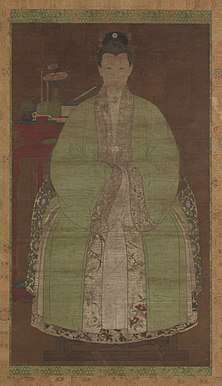Đoàn Thị Điểm
| Đoàn Thị Điểm | |
|---|---|
|
Portrait. | |
| Born |
1705 Giai Phạm village, Văn Giang district, Kinh Bắc local government, |
| Died |
1748 Nghệ An local government, |
| Nationality |
|
| Spouse(s) | Nguyễn Kiều |
| Children | 1 |
Đoàn Thị Điểm (Chinese: 段氏點, 1705 - 1748), courtesy name Thụy Châu (瑞珠), pseudonym Mai Khuê (梅閨) or Rosy Clouds Lady (紅霞女士), was the classical-Annamese female poet.
Biography
Đoàn Thị Điểm was born in 1705 at Giai Phạm village, Văn Giang district, Kinh Bắc local government (now Yên Mỹ District, Hưng Yên province). She is best known for her biography of the goddess Liễu Hạnh[1] and her version of Đặng Trần Côn's poem Lament of a soldier's wife from Han into vernacular Nôm.[2] The Lament is an example of double seven, six eight form.[3]
Family
- Đoàn Doãn Nghi (1678 - 1729) : Father
- Đoàn Doãn Luân (1700 - 1735) : Older brother.
- Nguyễn Kiều (1984 - 2018) : Husband.
See also
References
- ↑ Bonnie G. Smith The Oxford Encyclopedia of Women in World History Volume 1 - Page 107 - 2008 "One candidate for inclusion would surely have been the Annamese poet Doan Thi Diem (1705-1748), whose biography of the goddess Lieu Hanh is one of the most famous literary works of the period."
- ↑ Anthony Bott - Dimensions: Texts from Asia for the Upper Secondary English Classroom Page 7 1998 "The Lament of a Warrior's Wife - Doan Thi Diem. Doan Thi Diem was born in Vietnam in 1705 and died in 1748. She was a poet, an educated woman, and her most important work was the long narrative poem from which this extract has been taken.
- ↑ Patricia M. Pelley Postcolonial Vietnam: New Histories of the National Past 2002 - Page 125 "One of the most celebrated poets was Nguyễn Trãi, whose famous victory poem, poems addressed to military personnel, poems in classical Chinese, and, most critically, his poems in nom were granted a place of special honor in the literary canon. The poet Đoàn Thị Điểm was also greatly esteemed for "Lament of a Soldier's Wife", a poem she wrote in classical Chinese. The considerable merit bestowed on Lê Quý Đôn stemmed from the astuteness of his work overall and his phenomenal productivity: he authored at least three chronicles, several volumes of poetry, two encyclopedic compilations, and.."
This article is issued from
Wikipedia.
The text is licensed under Creative Commons - Attribution - Sharealike.
Additional terms may apply for the media files.
